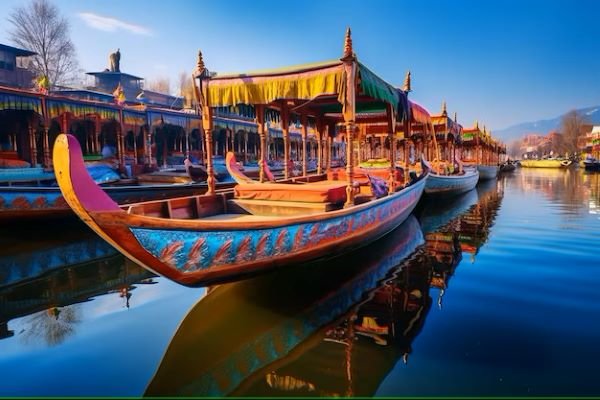Monday, December 2, 2024

In a groundbreaking move that merges technology with tradition, the ride-hailing giant Uber has launched its first water transport service in India, making Dal Lake in Srinagar the focal point for this new venture. As of December 2, 2024, Uber users can now book a shikara ride through the app, marking the company’s foray into the water-based transport sector. This service is aimed at enhancing the travel experience for both domestic and international tourists, offering a seamless blend of convenience and cultural immersion.
Uber’s Effort to Bridge Technology and Tradition
Uber’s entry into the shikara business is being hailed as an innovative initiative that combines the convenience of modern technology with the traditional allure of Kashmir’s iconic Dal Lake. The company introduced the service as a way to provide a more accessible and comfortable experience for travelers looking to enjoy a quintessential Kashmiri experience. According to reports, the Uber Shikara service is being presented as a unique and convenient way for tourists to enjoy a scenic ride without the hassle of negotiations or language barriers, often encountered in traditional shikara bookings.
Uber has emphasized that the aim of this service is to create a “seamless” and “iconic experience” for travelers visiting the breathtaking landscapes of Kashmir. It is positioned as a means to uplift tourism in the region and enhance accessibility to one of India’s most famous natural attractions, Dal Lake. By offering this new service, Uber intends to not only boost local tourism but also modernize the experience for travelers from all over the world.
Impact on the Local Tourism Sector
The launch of Uber Shikara has the potential to significantly boost tourism in Srinagar, especially among international visitors unfamiliar with the traditional booking processes associated with shikara rides. Uber has onboarded an initial fleet of seven shikaras, and the company plans to gradually expand the number based on demand. Travelers will be able to book these rides through the app at government-determined rates, ensuring a transparent and hassle-free experience for both tourists and local operators.
This new initiative is expected to be a game-changer for the shikara operators, as it will streamline bookings and eliminate the bargaining culture that has traditionally been a part of the experience. According to the president of the Shikara Owners Association, there are around 4,000 shikaras operating on Dal Lake, and Uber’s entry into the market is expected to increase business for operators. The service promises assured income for the shikara owners, who no longer have to rely on uncertain negotiations with tourists.
How the Uber Shikara Service Works
The Uber Shikara service operates from Shikara Ghat No. 6 on Dal Lake, offering rides between 10 a.m. and 5 p.m. each day. Each ride can accommodate up to four passengers and can be booked in advance, with the option of booking up to 15 days ahead. Uber users can book a shikara ride for one hour, with all fees being passed directly to the shikara operators, as Uber does not charge any commission or fees from its partners.
In a move to encourage more local participation, Uber has made it clear that it is not charging any fees from the shikara operators. This policy is expected to incentivize more boat owners to join the service as it grows. The company’s initiative aims to help operators build a more stable and profitable business model, without the stress of fluctuating tourist demand or negotiations.
Global Appeal and Future Expansion Plans
Uber’s expansion into water transport is not limited to India. The company has already been operating similar services in select European countries, including Venice, Italy, known for its gondola rides. This move shows Uber’s commitment to diversifying its portfolio and offering transportation services in new, innovative ways. The company’s entrance into India’s water transport market is a reflection of the growing interest in India as a key destination for global travelers, and it may inspire Uber to expand the service to other popular tourist spots across the country.
The shikara service could appeal to adventure seekers from around the world, who will now have the convenience of using Uber’s app to book a traditional boat ride in a globally recognized travel destination. This shift toward app-based services in regions like Srinagar may have broader implications for the local economy, opening up the potential for further technological innovations in other areas of tourism and local services.
Benefits for Tourists and Operators
- Transparent Pricing: Uber Shikara offers fixed government-approved rates, eliminating the need for bargaining.
- Convenience: The service can be booked up to 15 days in advance through the Uber app, ensuring a seamless experience for tourists.
- Increased Business for Shikara Operators: With Uber handling the booking, operators have a stable and predictable income stream.
Uber’s expansion into water transport services also represents an opportunity for greater global awareness of Srinagar as a tourist destination. The ease of booking and the high level of service offered could attract tourists looking for a reliable way to enjoy Dal Lake, further cementing Srinagar’s place on the global tourism map.
Looking Ahead: What It Means for the Future of Tourism
The launch of Uber Shikara is a step toward revolutionizing how tourists experience traditional transport services in India. As more shikara operators join the platform, it could redefine the tourism landscape in Kashmir, benefiting both local businesses and global travelers. The success of this service could also pave the way for Uber’s expansion into other forms of local transport in India, transforming the way tourists explore the country’s diverse cultural and natural attractions.
Uber’s initiative in Srinagar is an exciting development, offering an innovative approach to blending technology and tradition. The service has the potential to enhance the tourism experience for travelers, while also contributing to the local economy and making it easier for tourists to explore the picturesque beauty of Kashmir’s Dal Lake.




















